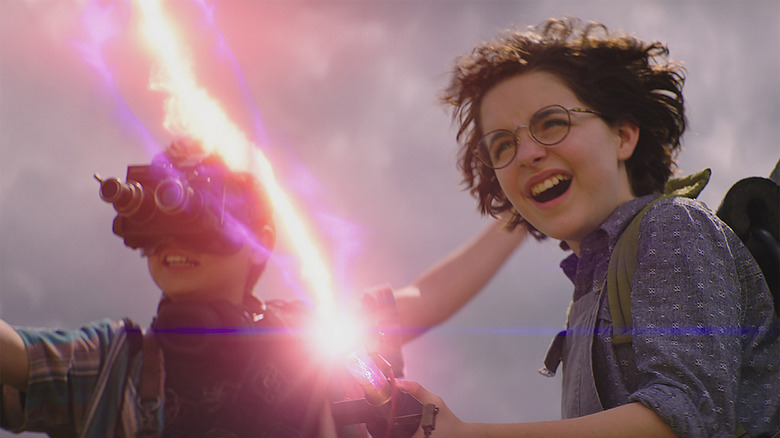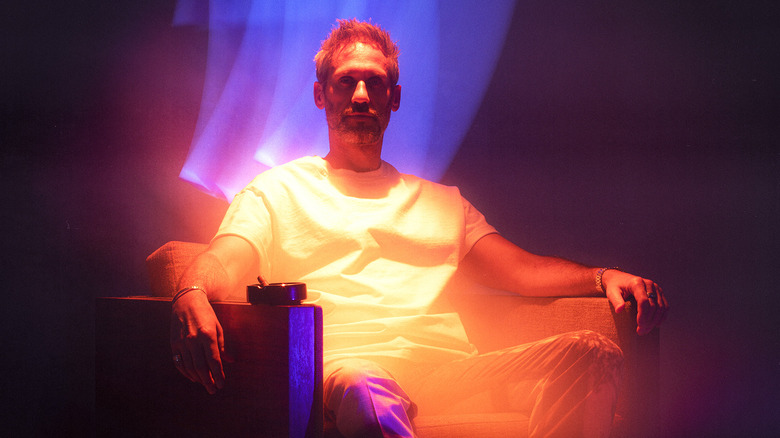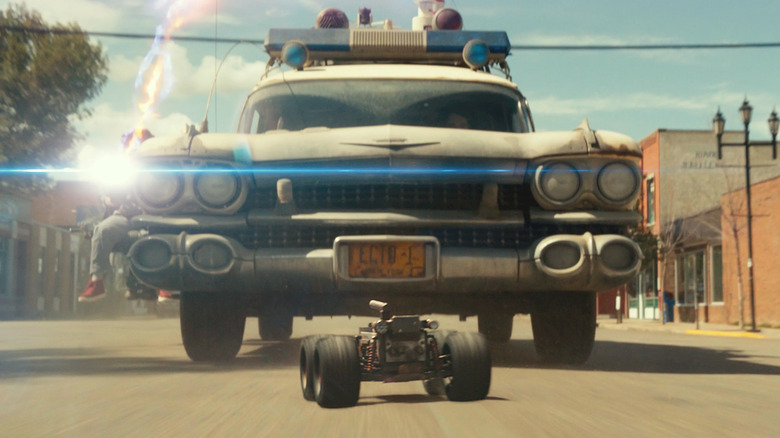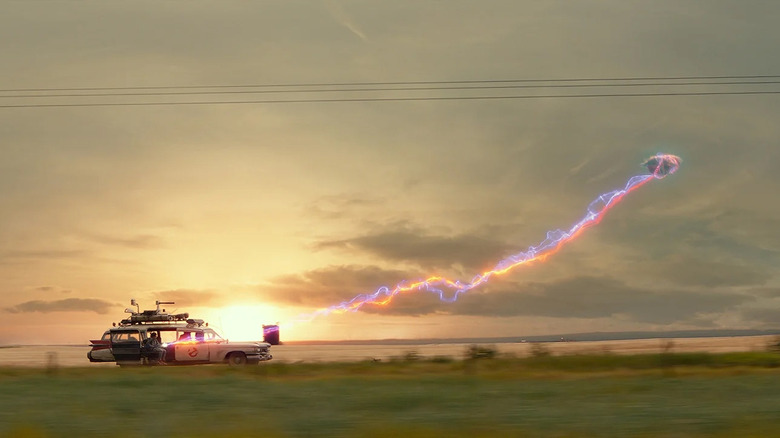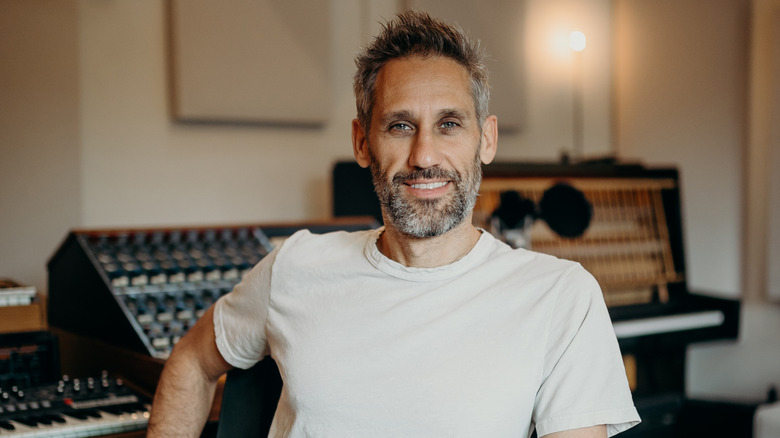Ghostbusters: Afterlife Composer Rob Simonsen On Emulating And Evolving The Original Ghostbusters Score [Interview]
Even though "Ghostbusters: Afterlife" has some sizable missteps in its slavish references to the original "Ghostbusters," one of the more praiseworthy elements of reverence and nostalgia comes in the form of Rob Simonsen's score for the sequel. Not only does the soundtrack perfectly utilize the familiar themes from composer Elmer Bernstein's original 1984 score, but it emulates and evolves the music to create a blockbuster score that calls back to the glory days of adventure movies of the 1980s. We spoke with Simonsen (pictured below) about the challenge of picking up the baton from Elmer Bernstein, a unique instrument that gives "Ghostbusters" a haunting ambiance, and the state of modern blockbuster scores.
"This was really about becoming a musicologist, and 'Ghostbusters' music scientist."
What was your relationship with "Ghostbusters" before you came on to compose the "Afterlife" score?
Just a big fan of the films, saw them a lot growing up, and quoted them gleefully with my group of friends. It's just been one of my favorites.
Right on. How did the conversation go with Jason Reitman when he asked you to take on the score? I know you worked with him a few times before, but I'm sure this job felt like something completely different.
He wanted to really carry on Elmer Bernstein's work, the sound and the spirit of the original score, into this one. When we sat down, that was really the main vision that he had and wanted to chat with me about. I knew that it was an exciting opportunity musically to see how we could develop the original material and take it forward. But this was really about becoming a musicologist, and "Ghostbusters" music scientist, and really spending a lot of time with Elmer's material. I looked at it as a wonderful learning opportunity and that's exactly what it was.
The "Ghostbusters" score in general is different from a lot of the previous work you've done, with this being the biggest movie you've worked on yet. How big of a dedication and time requirement was it to really dig into the nitty gritty of the score so that you were able to properly emulate the most memorable orchestral cues and themes?
Well, I think towards that end, Covid might have given us a favor. I think the whole film had more time — visual effects, sound design, music — and I think the film is better because of it. We would've, of course, delivered on time had we released when we were initially planning to. That's what we were all geared up for. Luckily, at that point, I had plenty of time with the material because Jason approached me before he started shooting. The script had been written, and he gave me a call and asked me to come read the script. From that moment, I got ahold of the score, started listening and watched the movies again, started studying the notes on the page, and playing around, kind of finding the ways that he wanted to score these scenes and started integrating them.
The Tools and the Talent
What's more difficult, accurately recreating those memorable orchestra cues from Elmer Bernstein or creating original music that fits with the vibe of that original score?
Wow. Well, I think finding new material, because when you're just quoting something, the work is all done. I think that we also knew early on that we were going to have to have certain styles of music and we were going to be scoring scenes that were unlike anything that was in the original. The question was, how do we do that?
We wanted this to feel like a mid-'80s action adventure film. That's where I went, my favorite action adventure '80s film scores. This score is an homage to a lot of that material and a lot of those composers and kind of my love letter to them because I grew up watching them and loving them. Those scores inspired me in so many ways and helped inspired me to be a film composer.
Which scores and composers do you think were the most influential to your work here?
John Williams, Alan Silvestri, James Horner, Craig Safan. They were the titans. They were doing these amazing scores like "E.T." and "Goonies." I should also mention "Cocoon," of course, "Star Wars" and "Indiana Jones" and "Back to the Future," and "Flight of the Navigator." There's an amazing list of films that had a certain spirit and a certain vibe. And Jerry Goldsmith, of course.
To your credit, the music is definitely has an Amblin spirit, and it hits right that sweet spot of those 1980s adventure movies. It also feels like a score that you wouldn't normally hear with a blockbuster today because that "Ghostbusters" score is so unique and some of the odd instrumental choices and the vibe it creates. I love the way that you incorporated that into these new themes into, especially the more exciting sequences with the orchestra arrangements.
Thanks. It was exciting. It's great when someone else does the work of finding the tune. This was getting to play with the tune and the chords had been so wonderfully composed by Elmer. To be able to draw upon those and expand and say, "Okay, well, what if this is this kind of fast paced, sweeping action, adventure music, but with Elmer's material." It was a fun experiment. It was kind of the time of my life. I had such fun.
Was there ever any discussion about doing some kind of orchestral variation or tribute to Ray Parker Jr.'s "Ghostbusters" theme song?
I think that we knew to leave well enough alone with that. It's just such a perfect song as is. I think Jason and I both love the original. Because it's a song, it's kind of in a different [place] than the rest of the score. I think from the beginning, Jason was pretty solid about his ideas with using the score and just leaving the song alone. The song made its way into the film just as it was. It still sounds great. I mean, that song is just a certified banger.
"It has this vocal quality to it and it's a very kind of spooky human kind of sound."
I've never thought to ask this before, so I figured I might as well just ask the source. What are the instruments that are used to make those more haunting sounds in the original score? I guess the best way to describe them is the spooky whistles and whatnot.
That's an instrument called the Ondes Martenot. It's one of the earliest synthesizers, and it's this electric instrument that has keys, but it also has this metal wire that runs across in front of the keys, and there's a ring. You put your finger inside the ring and you can slide up and down so you get this very smooth tone. That's when you get these very, almost vocal type sounds. You can vary the tone of it. It's very similar to a theremin, but a theremin you play with your hand in the air, and this you play putting your finger in this ring and gliding your hand in front of the keys. You can see what pitch you're at because the ring is right in front of the key of the pitch.
It's a beautiful instrument. I actually used it on my record and [composer] Johnny Greenwood owns one. He's used it in his work with Radiohead and his work in film scores. It's a really beautiful instrument. Elmer used it on many of his film scores. It wasn't just "Ghostbusters," but of course it fit perfectly for "Ghostbusters" because it has this kind of ghostly sound.
That was one of the first things that Jason and I talked about, that we had to use the Ondes. The woman who played for many of Elmer's scores and who played the Ondes on "Ghostbusters" is named Cynthia Millar, and she's still around. We brought her into the studio in London. Unfortunately, we weren't able to travel at that time, so we just did it remotely, but we had her come in and play down all the parts to the new score. That was just such a treat.
That is awesome. I was actually going to ask if there was anybody from the original orchestra who was still around and playing to partake in the afterlife score.
I had one, I think it was a string player, get up at the end of the session. When I came out and was talking to them a little bit, he said, "Yeah, I played on the original."
That's awesome.
I think there were some other musicians besides Cynthia that played on the original. It's humbling to be a part of such a legacy.
I had a very specific question because this sound caught me off guard. Right around one minute into the track number 12, there's a very high-pitched sound. It almost sounds like a scream. Is it an actual scream, or is it that the instrument we just talked about? That might be too specific of a moment for you to recall.
Yeah. That's the Ondes.
Wow. That's crazy. Because for a second, it sounds like a very high-pitched scream.
It does. It has this vocal quality to it and it's a very kind of spooky human kind of sound. It's a really wondrous instrument. It's very beautiful.
"I think and I hope that the days of romantic, melodic film scoring will come back."
On a more general note, I wanted to get your take on the state of blockbuster scores today. Do you feel like maybe the days of truly great and recognizable themes for movies being so prominent in pop culture have gone out the window somewhat?
I think that, well, I have to credit this with the mastering engineer that mastered the "Ghostbusters" Afterlife" soundtrack. I was talking with her about what it was that made those scores in the '80s sound like how they sound? There are so many iconic scores and have a certain sound. I was asked her, "What do you think it was? Is it just the writing? Was it the fact that they recorded to tape? Was it the microphones? Was it the mix board? What part of it do you think really gives those scores their sound?" Her answer was, "It was a more innocent time."
To me, that was such a smart and beautiful answer. I think it's true. I think that there was a spirit back then, and people could kind of go for it, and it was okay. It didn't feel out of place. I think that we know so much about what goes on in the world now. We know about the atrocities happening in the world of every day. I think that it's, in general, things have gotten darker, and they've gotten more pensive, and in a lot of ways, more kind of constantly thundering.
There's so much more base information in a lot of modern scores than there was in scores in the '80s, also because sound systems are capable of replicating such a wider part of the frequency spectrum. But I do think that there is a spirit to a lot of those scores. I think and I hope that the days of romantic, melodic film scoring will come back. I do. That's not to say that I don't also love to be reserved and restrained and used very minimal instruments. That's something that I love too, but I do hope to see a return to that because it just makes me smile.
I completely agree. Obviously, you have a reverence and admiration for a lot of these famous composers from the '80s. Who are some of the composers today who you've been enjoying their work?
Johnny Greenwood, Nicholas Britell, Emile Mosseri, Jóhann Jóhannsson, rest in peace. One of my good friends, Dustin O'Halloran. There's a really wonderful wave of music happening in film right now. I think it's inspiring and I think the state of film music today is in a really cool place. It feels like a very open field and people are looking to experiment.
Also at the end of the day, I think that music that has heart is the most important thing because I think that what comes from the heart reaches the heart.
"Ghostbusters: Afterlife" is in theaters now and the soundtrack is available to stream and purchase everywhere.
